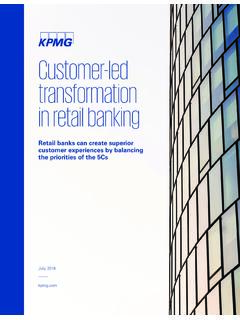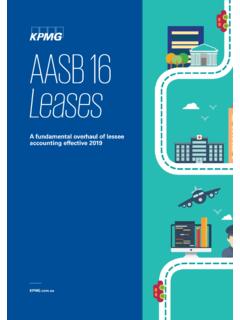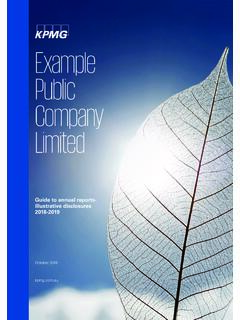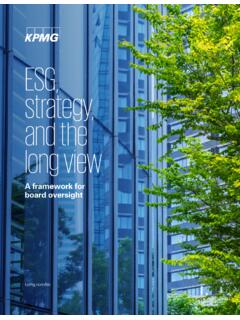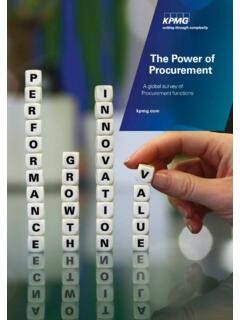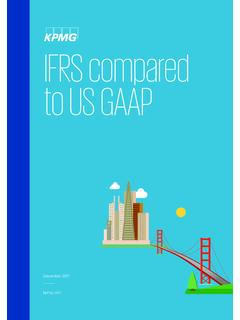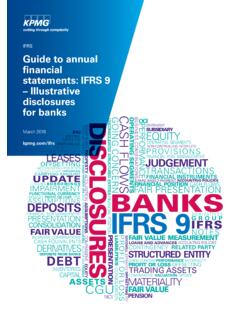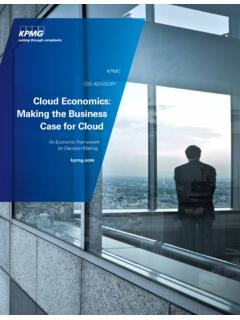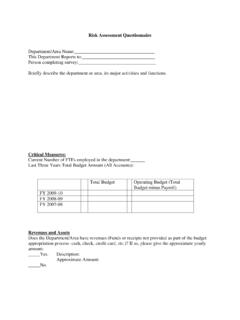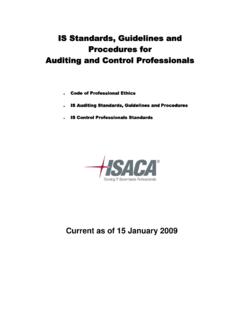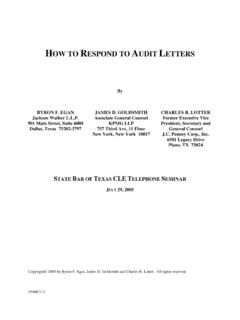Transcription of The UK Corporate Governance Code - assets.kpmg
1 2018 kpmg LLP, a UK limited liability partnership and a member firm of the kpmg network of independent member firms affiliated with kpmg International Cooperative ( kpmg International ), a Swiss entity. All rights reserved. The UK Corporate Governance CodeThe Financial Reporting Council (FRC) has issued a revised UK Corporate Governance Codeto reflect the changing business environment and help UK companies achieve the highest levels of Governance . The code is shorter and sharper than previous Codes, focuses on the importance of long-term success and sustainability, addresses issues of public trust in business and aims to ensure the attractiveness of the UK capital market to global Corporate Governance reforms kpmg Board Leadership CentreThe revised code is built on an updated set of Principles emphasising the value of good Corporate Governance to sustainable growth.
2 It is intended that by applying these Principles, following the more detailed Provisions and using the associated guidance, companies will be better able to report how their Governance structure contributes to its long-term success. The code is supported by the revised Guidance on Board the introduction to the code emphasises the importance of the code Principles (the Listing Rules require companies to make a statement of how they have applied the Principles in a manner that would enable shareholders to evaluate how the Principles have been applied ), the Provisions continue to establish good practice on a comply or explain basis (as required by the Listing Rules).ApplicationThe revised code is applicable to all companies with a premium listing, whether they are incorporated in the UK or elsewhere, and applies to accounting periods beginning on or after 1 January 2019.
3 Other listed or unlisted companies may wish to adopt the code in whole or in part. Leadershipand purposeThis section of the code brings together a number of concepts and makes it clear that the board should consider the culture of the company and wider stakeholder interests to achieve long-term stakeholders and directors dutiesNotwithstanding the primary duty of directors being to promote the long-term success of the company, the FRC believe companies can do more to recognise that other stakeholders, particularly their own workforces, play a significant part in that success. Therefore, the revised code encourages Corporate Governance policies and practices that generate value for shareholders and aim to benefit society. In particular, there is a new Principle setting out that: A successful company is led by an effective and entrepreneurial board, whose role is to promote the long-term sustainable success of the company, generating value for shareholders and contributing to wider society.
4 (Principle A)Furthermore, there is a new Provision which requires (on a comply or explain basis) that the board should: .. understand the views of the company s other key stakeholders and describe in the annual report how their interests and the matters set out in section 172 of the Companies Act 2006 have been considered in board discussions and board should keep engagement mechanisms under review so that they remain effective. For engagement with the workforce, one or a combination of the following methods should be used: a director appointed from the workforce; a formal workforce advisory panel; a designated non-executive the board has not chosen one or more of these methods, it should explain what alternative arrangements are in place and why it considers that they are effective.
5 (Provision 5)Each of the three suggested methods for engaging with the workforce have their merits and challenges and there are other mechanisms which might be deployed in combination with the methods explicitly addressed in the code . For example, board composition, board induction and professional development, walking the floors , staff surveys, social media and formal agenda items are all relevant to understanding the views of employees. We believe that most companies will opt for some form of workforce advisory panel as, in practice, both workforce directors and designated non-executive directors would require some form of workforce advisory panel in order to get exposure to a broad range of workforce using the term workforce , the FRC is encouraging companies to consider how their actions impact on both those with formal contracts of employment (permanent, fixed-term and zero-hours) and other members of the workforce who are affected by the decisions of the board.
6 For example, those engaged under contracts of service, agency workers, and remote workers, regardless of their geographical location. Companies should be able to explain who they have included and publications Workforce directors,Designated NEDandWorkforce advisory panels explore some of the advantages and challenges of these models. The ICSA and Investment Association s guidance The Stakeholder Voice in Board Decision makinglooks at some of the broader considerations around stakeholder engagementShareholder engagement has been given greater prominence with the introduction of a revised Provision: In addition to formal general meetings, the chair should seek regular engagement with major shareholders in order to understand their views on Governance and performance against the strategy.
7 Committee chairs should seek engagement with shareholders on significant matters related to their areas of responsibility. The chair should ensure that the board as a whole has a clear understanding of the views of shareholders. (Provision 3)The explicit reference to committee chairs seeking engagement with shareholders on significant matters related to their areas of responsibilitymight prove challenging in some areas. For example, we regularly hear audit committees express a concern that substantive engagement with investors can be difficult to achieve. Committee chairs may need to redouble their efforts, but success in this space will also require the commitment of the investor community (and that might in turn require additional resources being deployed in this area).
8 Significant votes against resolutionsThe code was amended in 2014 in relation to voting practices, so that companies should engage with shareholders where they receive significant votes against resolutions at their annual general meetings. The revised code is now more specific about what should be expected of companies. When 20 per cent of more votes have been cast against the board recommendation for a resolution, the company should explain, when announcing voting results, what actions it intends to take to consult shareholders in order to understand the reasons behind the result. An update on the views received from shareholders and actions taken should be published no later than six months after the shareholder meeting. The board should then provide a final summary in the annual report and, if applicable, in the explanatory notes to resolutions at the next shareholder meeting, on what impact the feedback has had on the decisions the board has taken and any actions or resolutions now proposed.
9 (Provision 4)Twenty percent or more votes against is also the threshold adopted by the Investment Association in determining what significant shareholder opposition to proposed resolutions should be included in their Public FRC is clear that Corporate culture can be a key ingredient in delivering long-term sustainable performance. When there is a healthy culture, systems, processes and people coalesce to support long term success and enhance trust. Equally, a poor culture can be a significant business importance of culture features throughout the revised code . In particular, Principle B stresses the importance of the board establishing a company s purpose, values and strategy, and satisfying itself that these and its culture are aligned.
10 Provision 2 specifically states that: The board should assess and monitor culture. Where it is not satisfied that policy, practices or behaviour throughout the business are aligned with the company s purpose, values and strategy, it should seek assurance that management has taken corrective action. 2018 kpmg LLP, a UK limited liability partnership and a member firm of the kpmg network of independent member firms affiliated with kpmg International Cooperative ( kpmg International ), a Swiss entity. All rights reserved. The annual report should explain the board s activities and any action taken. In addition, it should include an explanation of the company s approach to investing in and rewarding its workforce. (Provision 2)Division of responsibilitiesThis section of the revised code considers the separation of duties within the board and between its various compositionKey changes here include the removal of the relaxed board balance criteria for companies outside the FTSE350 code compliance for allcompanies now requires that at least half the board, excluding the chair, should be non-executive directors whom the board considers to be independent.
